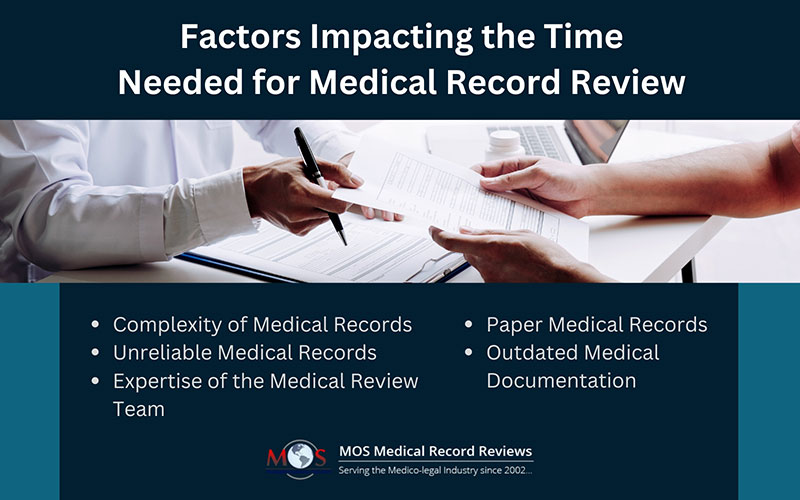Injury claims that involve medical records could be related to workplace injuries, auto accidents, product liability, medical malpractice and so on. An attorney accepts such cases only after a comprehensive review of the relevant medical records, preferably with the support of an experienced medical records services provider, to determine if the claim is a legitimate one. The medical records are reviewed by a review team comprising professionals with the required expertise. This analysis provides valuable information such as the medical care provided, negligence if any, and how the patient was impacted.
Do you need expedited medical records services?
Factors Affecting the Time Needed for Medical Record Review

The time required for record review depends on aspects such as the intricacy of the case, the volume of medical records, and their availability. If the case/claim is a simple one, it could take a few weeks whereas complex cases may require many months to complete. So, the time required for medical record analysis depends upon certain key factors.
- Complexity of the medical chart: The medical chart of a patient receiving a number of diagnostic and treatment procedures will be complex. The more the number of records, the more is the time required to review them. Medical data evaluation becomes challenging with the presence of difficult medical terminology, complex medical procedures, use of short forms, and the frequent updating of data in flow sheets and assessment sheets. Some physicians still follow handwritten patient records. If the handwriting is illegible, it becomes difficult to verify the details of the injury and ensuing treatments.
- Unreliable medical records: Patient records are sometimes erratic with wrong diagnostic results, mistakes in transcription, incorrect medication instructions, incorrect abbreviations and other such mistakes. The records may be paper or electronic. Poor handwriting and low-quality photocopying may affect the readability of the record. Lack of clarity regarding abbreviations, acronyms and medical codes used to signify the diagnoses and treatment complicate and delay the record review process.
- Absence of digital copies: This makes it difficult to retrieve and manage the records.
- Outdated medical records: When medical records are not updated regularly and kept in chronological order, it provides unreliable medical data and delays the review process.
- Expertise of the medical review team: The expertise of the reviewers is also an important consideration. To review the records, you need to have clinical knowledge. When an attorney has this done in-house, paralegals and others who are assigned the review process may face difficulties with the terminology and format of the medical records.
A Medical Review Company Can Assist
Medical record review can be expedited if it is outsourced to a company providing medical record retrieval services. At present, AI tools (Artificial Intelligence tools) are available that can help streamline the medical record analysis. They can speed up the review and help index the medical records, prepare a chronological timeline of the claim, and extract data from hundreds of medical records. Advanced tools also quickly identify missing records, so these can be requested at an early stage of the claims processing. Artificial intelligence tools can review 750 or more pages in an hour, which is much more than what human reviewers can achieve. Naturally, with such expert assistance, medical record analysis and claims processing can be more easily and effortlessly done.
MOS Medical Record Reviews provides customized solutions for attorneys.
Call 1-800-670-2809 to schedule a consultation.




